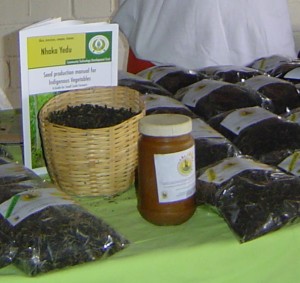Zimbabwe rural farmers adding value to traditional foods
Friday, July 16th, 2010 by Dydimus Zengenene
In past agricultural shows in Zimbabwe exhibitors have showcased raw agricultural products straight from the farm. However very few of us ever knew that there are amazing value addition initiatives taking place in the remote rural places like Lower Guruve, Murehwa, Mutoko and others. The Processed Products Fair, the first of its kind held at the Harare Show Grounds on the 14th of July 2010 opened a new page in history. With traditional mbira music playing in the background, people mingled looking at the traditional goods that were on sale.
The show was organized by Zimbabwe Adding Value to Sustainable Produce (ZAVSAP), a coalition of nine Local Non Governmental Organizations that spearhead the introduction and training of value addition initiatives in the rural parts of Zimbabwe. Some of the organizations that showcased brilliant products include the Community Technology Development Trust (CTDT), Lower Guruve Development Association (LGDA), Caritas Zimbabwe, and Cluster Agricultural Development Services (CADS) among others.
Mr. Thomas Pouppwz, the ZAVSAP Communications Facilitator explained that his organization is a coalition of organizations that work largely in Mashonaland provinces to ensure food security. The network comes up with initiatives like workshops, training and scholarships. The network discovered that Zimbabwe has a lot of potential but its agricultural goods are being sold unprocessed.
He explained that the fair’s purpose is to show what is happening out in the rural areas, and market the products. One interesting move is the invitation of other NGOs and businessmen who might make deals with farmers so that the products may be sold on a larger scale.
Memory Rusike a farmer who works with CTDT expressed great interest in the project of producing traditional vegetables. She explained that these vegetable are very helpful to people that are living with AIDS. She confidently explained the process of drying the vegetables using a locally invented solar drier. Memory encouraged young children to stop looking down upon traditional vegetables, which she said, keep people healthy.
Ms. Muslin Fusire, one of the Programme Managers for CTDT, explained that the organization noticed that the traditional vegetables were fast becoming extinct despite their being more nutritious than the exotic ones. As a result the organization started to promote the production, utilization and commercialization of traditional vegetables. Ms Fusire feels encouraged that men are also coming aboard the venture, which is usually called “a women’s business”. Commenting on the impact that the project has had on people, she indicated that the benefits have been both economic and nutritional.
Mr. Sherperd Kamudyariwa, a bee farmer from Lower Guruve Developmemt Association, explained how he produces products from honey. His range of products include wax, mosquito repellent jelly as well as honey.
Lillian Machivenyika, from Cluster Agricultural Development Services (CADS) explained that her organization operates in Mashonaland East and Mashonaland Central. She said CADS works with community-based organizations in teaching farmers how to produce crops and further process them. CADS have also published a recipe book that contains all the information on how some products are produced and further processed.
In Zimbabwe today it is encouraging that rural people are getting this support to add value to their products. Of worry is the fact that the projects seem to be largely NGO driven. The government is called upon to intervene and cooperate in this endeavor, which has the potential to see the farmers of traditional foods making a mark on both the local and global market. It is our great hope that the Processed Product Fair will become an annual event and will also draw international attention.










